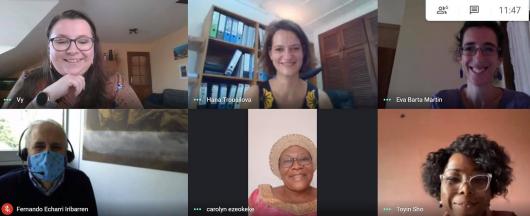
EUNIC Nigeria – CULTURE OF MEMORY
06.12.2021 / 15:46 | Aktualizováno: 07.12.2021 / 10:57
This year, the EUNIC Nigeria cluster implemented an extensive virtual project in which foreign experts in the field of museology participated, including two Czech experts, Monika Mikulášková from the Brno Region Museum and Michal Medek, director of the Institute for Local Heritage Interpretation of the Czech Republic. During the year, the project gained a good reputation both among the participants and among the cultural institutions in Nigeria that monitor the issue of museology. That is why the US consulate also took part in the fourth workshop (of course, the US consulate is not a member of EUNIC). The participants in the project were both Nigerian state museum institutions (eg Lagos National Museum, Calabar National Museum, Kano National Museum) and private museum institutions (Yemisi Shyllon Museum). A total of 40 professionals from 11 institutions took part in the project.
The first workshop on Museum and education scheduled for 21st and 22st of April 2021, was facilitated by three invited experts - Mrs Monika Mikulasova, Prof. Fernando Echarri Irribarren and Dr Carolyn Eze okeke. The workshop comprises three sessions to enable experts deliver their professional insightindicating their understanding, strategies, challenges and solutions to museum education as itaffects their different countries. Breakout sessions after the presentation allowed each expert time with smaller group of participants. Hands-on activity as well as specific situations were explored as case studies and workable solutions were proposed for specific museums. Second workshop on Museum Audience Development and Interactive Participation workshop took place on the 25th and 26th of May 2021. The three experts in attendance were - Cornelia Knoll, Mr Patrice Deparpe and Dr Aime Kantoussan. The three sessions highlighted expert experiences in audience development and Interactive participation from African and European perspective. Their delivery however was informed and influenced by their varying museums situation.
The third workshop on Museum as interactive public spaces took place on the 17th and 18th of June 2021 with three experts in attendance – Michal Medek (Czech Republic), Elena Martínez-Jacquet (Spain) and Mr Gimba (Nigeria). The first three sessions took place in the morning of the first day. Eachexpert delivered their professional insight, with experiences through various case studies on the interactivity within museums. The session was followed by Q and A, discussion and breakout sessions with smaller group. Practical activities prepared by experts were very useful and insightful in understanding the impact of interpretation in making an exhibition more interactive. The opportunity of making Nigerian museums and galleries more interactive through social media interventions was proposed. A t the time of the workshop,debates on restitution was ongoing in the media and the gathering was an opportunity to engage museum curators on how they intend to make the restitution discourse a reality through the discourse of restitution was also engaging.
The fourth workshop on digitization was led by one American and two Nigerian experts - Leah Jones (USA), Jumoke Sanwo (Nigeria) and Oludamola O. Adebowale (Nigeria) and was attended by newly invited representatives of local museum institutions. It took place from 8 to 14 September 2021. Due to the time lag, the workshops were held in the afternoon, and each day was started by one of the experts. This was followed by two-day group sessions in a narrower circuit.
EUNIC Nigeria has decided to continue its museum projects. Among the experts and participants in this year's workshops were several young professionals, including M. Mikulášková, who were selected for a project we plan to implement in 2022. The project "RESIM" is designed for a small group of highly motivated museum professionals from Nigeria and Europe who will become multiplication agents within Europe, Nigeria, and possibly also within the West African region. Their individual projects should become a model of properly implemented museum representation of different cultures, through innovative museum procedures. The aim is also to give European young professionals a better knowledge of the context of Nigerian museums and how best to present African culture and heritage in Europe. The project is aimed at six young professionals, mainly from the museums we worked with in the previous project, when we had the opportunity to assess their involvement. The project should take the form of small residency programs in both Europe and Nigeria and should enable participants to gain better practical and theoretical know-how in a pre-defined field of museology.









